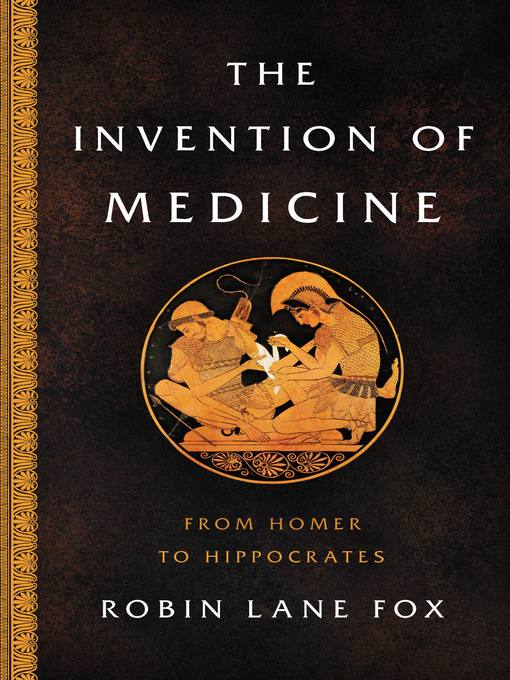
The Invention of Medicine
From Homer to Hippocrates
از هومر به Hippocrates
کتاب های مرتبط
- اطلاعات
- نقد و بررسی
- دیدگاه کاربران
نقد و بررسی

October 15, 2020
Fresh historical context--social, cultural, and intellectual--on the emergence of an entirely new medical practice in ancient Greece. In his latest, classicist Fox, a winner of the James Tait Black Award and Duff Cooper Prize, among others, focuses on the Hippocratic corpus that entered the Greek medical discourse in the fifth century B.C.E. In a meaty exploration, the author closely examines the Epidemics, a collection of books attributed to Hippocrates--the founding father of rationally based medicine--and his immediate associates, which posited a conceptual break with earlier medical practice. "They are the very first observations and descriptions of real-life individuals during a number of days which survive anywhere in the world," writes Fox, who is consistently thorough and logically coherent as he delves into the language, style, and content of the texts. The Hippocratic authors believed that humans were "part of a natural world which is explicable in terms of underlying elements and forces." Thus, when considering health and treatment, they excluded the influence of the gods, which was a far cry from the "thought-world" of Homer. Equally important was the emphasis on ethical principles guiding the hands of practitioners of their craft. Combined, the books present a significant medical course of understanding, explanation, and prediction. Fox also pays close attention to "voiceprints" and the relevant contexts of the books, seeking to pin down their dates, which are disputed among scholars. In the process, readers journey with the author through such topics as art and art dating; place portraiture; the effects of new medical concepts on dramatists Aeschylus, Sophocles, and Euripides as well as historians (a great deal more on Thucydides than Herodotus); the role of sanctuaries in ancient Greek cities; the relation of diseases to seasons and climates; and the ties binding together the Hippocratic texts, "masterpieces of method and observation" that would serve as reference books for fellow doctors. Searching, lucid, and challenging, Fox's book presents a vivid picture of Hippocratic creativity.
COPYRIGHT(2020) Kirkus Reviews, ALL RIGHTS RESERVED.

Starred review from November 1, 2020
Medical knowledge existed in the Greek world long before the classical period, but the textual evidence we have from this time suggests new ways of practicing and understanding emerged as the archaic period ended. Fox (Augustine: Conversions to Confessions), in his characteristic thoughtfully argumentative and practical style, sifts through centuries of epigraphic, numismatic, and archaeological evidence to place the so-called Epidemic texts in a new context. Understanding their authorship and reception helps to frame the popular and artistic understandings of medicine in the classical period and in the Roman and Arab worlds in later centuries, who all drew on these texts. While the scope of the book is largely limited geographically to the island of Thasos, its strategic location allows a larger picture of Greek medical history as it existed in Attica and Asia Minor. A concluding section on retrospective diagnosis and the impact of these texts makes the case that we should not be overtempted to understand the past in light of modern knowledge. VERDICT While some of the material may be dense for non-classicists, there are many readers who will find the sections about how we tell and understand medical stories timely and important.--Margaret Heller, Loyola Univ. Chicago Libs.
Copyright 2020 Library Journal, LLC Used with permission.

November 1, 2020
Esteemed historian Fox (Augustine, 2015) meticulously explores the evolution of the craft of medicine in ancient Greece. He focuses on the rise of ""rational medicine"" as it began replacing belief in divine intervention. In the writings of Homer (c.700 BCE) and historians Herodotus and Thucydides (c.400 BCE), Greek physicians were depicted as having valuable roles and a sort of ""kindliness."" These authors also described traumatic injuries and their treatments. The towering figure was Hippocrates of Cos (c. 460 BCE), a physician-writer widely recognized as the father of medicine and famous for the ethical standards in the Hippocratic Oath. The hefty Hippocratic corpus (some 51-72 texts, many of which were not written by Hippocrates himself) effectively ""invented"" the medical craft. The manuscripts describe fevers, wounds, epilepsy, nosebleeds, menstrual problems, mental illness, and even an outbreak of mumps. These descriptions emphasize careful observation, record keeping, and a set of formal skills, with more weight given to prediction or prognosis of the illness than to treatment. Fox presents an enlightening discussion of the origins of the West's medical profession.
COPYRIGHT(2020) Booklist, ALL RIGHTS RESERVED.

























دیدگاه کاربران